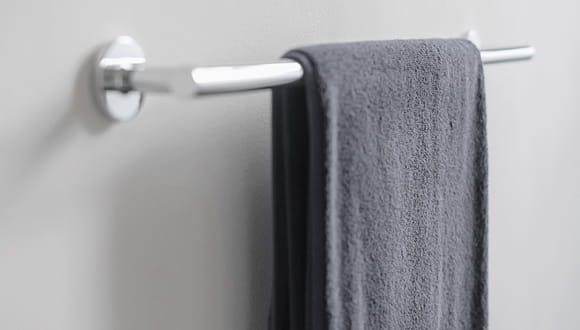How Often Should You Wash Your Bath Towel?
Dec. 28, 2023 - Katie McCallumIt's customary to wash certain items in our home after every use, like dinner plates. Removing debris and residue doesn't just keep dishes looking visibly clean, it removes the microbes that can accumulate and feed on leftover food.
But then there are those things we tend not to wash with each use, like our bath towels. Unlike a food-caked plate, our towels typically don't look dirty. Plus, we use them after cleaning our body ... so they're not likely to be germy, right?
"A variety of microorganisms, including bacteria, fungi and viruses, can all grow on the fabric of towels," says Dr. Jennifer Maender, a dermatologist at Houston Methodist. "Respiratory viruses and fungi can survive for several days on fabric, while bacteria can survive two to three weeks."
Some of these microbes are just stinky, contributing to that musty smell a towel collects the longer it goes unwashed. Bleh. But others can cause skin infections ranging from annoying to downright harmful. It's why Dr. Maender says it's important to be sure you're washing your towels frequently enough.
How often should you wash your bath towel?
Once a week. Every other week. Whenever there's finally some time to get laundry done. Everyone has their own answer to how often they wash their towels. But what's the hygienically appropriate schedule?
"Bath towels and hand towels should be laundered after every three uses," says Dr. Maender. "This helps remove the contaminants that can cause infections and reduce odor-causing bacteria."
No one likes a funky-smelling towel, but potentially harmful microbes represent the important health concern. These include methicillin-resistant Staphylococcus aureus (MRSA), which can cause severe staph infections, and fungi that cause itchy skin infections, like athlete's foot.
"People with diagnosed skin conditions, like acne or eczema, should take extra care to keep their towels clean," adds Dr. Maender. "These conditions compromise the skin barrier, so bacteria are able to enter the skin and potentially cause an infection even more easily."
Some types of towels should be laundered after every use
Bath and hand towels are used for drying. But other types of towels are used for cleaning. The latter will need to be washed more frequently.
"Wash cloths come into contact with contaminated areas of the skin that aren't yet clean," says Dr. Maender. "As such, they should be washed after every use."
Gym towels used to wipe down machines and wipe away sweat should be cleaned after each use as well. In fact, shared gym equipment is a breeding ground for microorganisms. And a moist gym towel is a perfect environment for microbes, like the ones that cause staph infections and athlete's foot, to survive and grow.
"Don't forget to throw away and replace your loofah sponge every couple of weeks," says Dr. Maender. "These can also harbor infection-causing microorganisms if kept for too long."
More tips for keeping towels clean
The rules above can help keep your towels free of odor- and infection-causing microbes, but Dr. Maender has a few more tips to share:
- Hang bath and hand towels to dry. Don't pile or bunch towels in a manner that prevents drying. A moist, damp environment is an ideal place for microbes to grow. By allowing the fabric to completely dry between uses, you make the environment less hospitable for microbes to multiply. Additionally, make sure towels are fully dry before tossing them to sit in a laundry hamper.
- Wash towels with detergent in a washing machine. Soaking, agitation, heat and detergent are all essential for keeping towels clean and hygienic.
- Don't overload the washing machine. To ensure sanitization, make sure towels have plenty of space to move freely in the basin.
- Know that humid environments make it harder for towels to dry. Humidity can make it harder for towels to dry, so extra care should be taken to ensure they dry completely between uses. Alternatively, towels can be washed more frequently.
- Avoid leaving towels damp in the washing machine. We all forget we've got laundry in the wash now and then but try not to let this become a habit. A damp washing machine is an ideal place for microbes to grow and multiply.








